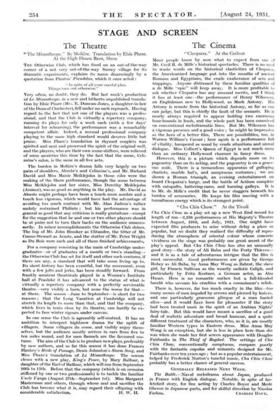STAGE AND SCREEN The Theatre
The Misanthrope." By Moliere. Translation by Elsie Phare. At the High House Barn, Shere
THE Otherwise Club, which has fixed on an out-of-the-way corner of a not very out-of-the-way Surrey village for its dramatic experiments, explains its name disarmingly by a quotation from Plautus' Pseudolus, which it once acted :
" In spite of all your careful plan Things turn out otherwise."
Very often, no doubt, they do. But last week's production of Le Misanthrope, in a new and hitherto unpublished transla. tion by Elsie Phare (Mrs. E. Duncan-Jones, a daughter-in-law of the Dean of Chichester), fell under no such reproach. Having regard to the fact that not one of the players was a profes- sional, and that the Club is virtually a repertory company, running its plays for only a week each (with a few days' interval for rehearsing), the performance was a remarkably competent affair. Indeed, a normal professional company playing to the same high standard would deserve little but praise. Miss Phare's translation in rhymed couplets was spirited and neat and preserved the spirit of the original well, and the players, who are their own scene-shifters, were relieved of some anxieties this time by the fact that the scene, Celi- mene's salon, is the same in all five acts.
The burden in Moliere's drama falls very largely on two pairs of shoulders, Alceste's and Celimene's, and Mr. Richard David and Miss Maisie Meiklejohn in those roles were the making of the Shere performance, though the scene between Miss Meiklejohn and her sister, Miss Dorothy Meiklejohn (Arsinoe), was as good as anything in the play. Mr. David as Aleeste might perhaps have been a touch more sombre and a touch less vigorous, which would have had the advantage of avoiding too much contrast with Mr. Alan Judson's rather unduly restrained Philinte ; but his performance was in general so good that any criticism is really gratuitous—except for the suggestion that he and one or two other players should be at pains not to turn their backs on the audience unneces- sarily. In minor accomplishments the Otherwise Club shines. The lisp of Mr. John Brooker as Clitandre, the titter of Mr. Cosmo Stewart as Acaste, and the stutter of Mr. Peter Wright as Du Bois were each and all of them finished achievements.
For a company consisting in the main of Cambridge under- graduates—or of graduates of a month or two's standing— the Otherwise Club has set for itself and other such ventures, if there are any, a standard that will take some living up to. Its short history has been eventful, but the movement, even with a -few jolts and jerks, has been steadily forward. From frankly amateur theatricals played in a Women's Institute hall at Peaslake it has advanced to the status of what is virtually a repertory company with a perfectly serviceable theatre—very visibly a barn, but none the worse for that— at Shere. The season—June to September—is short for two reasons : that the Long Vacation at Cambridge will not stretch its length to more than that, and that the company, which lives in tents close by its theatre, can hardly be ex- pected to face winter rigours under canvas.
In one sense the Club is agreeably self-centred. It has no ambition to interpret highbrow drama for the uplift of villagers. Some villagers do come, and visibly enjoy them- selves, but the audience mostly arrives in cars from five to ten miles round, and for men flannels are the favoured cos- tume. The aim of the Club is to produce new plays, preferably by new authors, and so far this season it has done Frances Hankey's Birds of Passage, Denis Johnston's Storm Song, and Miss Phare's translation of Le Misanthrope. The season closes with a new play, King's Peace, by Mary Balfour, a daughter of the Earl of Balfour, which will run from September 10th to 15th. Before that the company (which is on occasion stiffened by one or two professionals) is to tackle the familiar Uncle Vanya (August 27th—September 1st). Miss Margaret Masterman and others, through whose zeal and sacrifice the Club has become what it is, may regard their offspring with


































 Previous page
Previous page